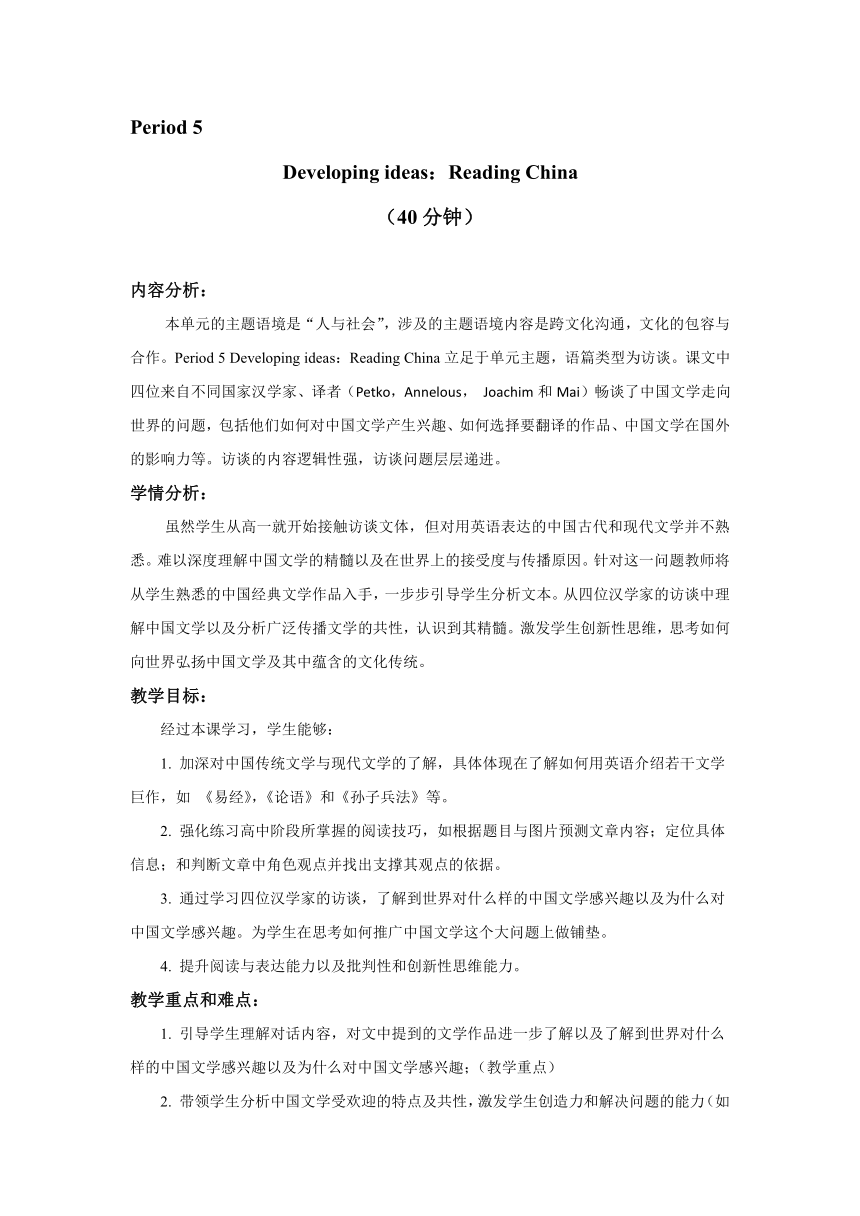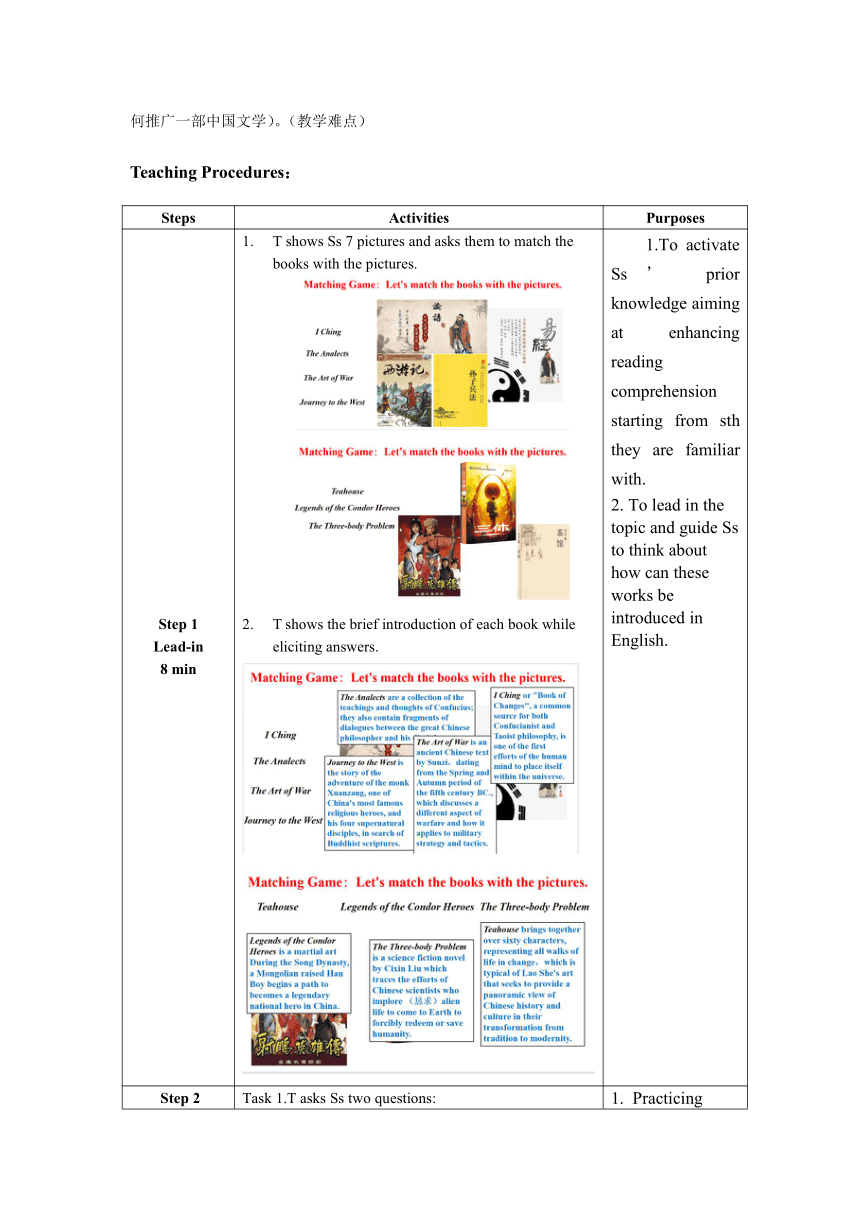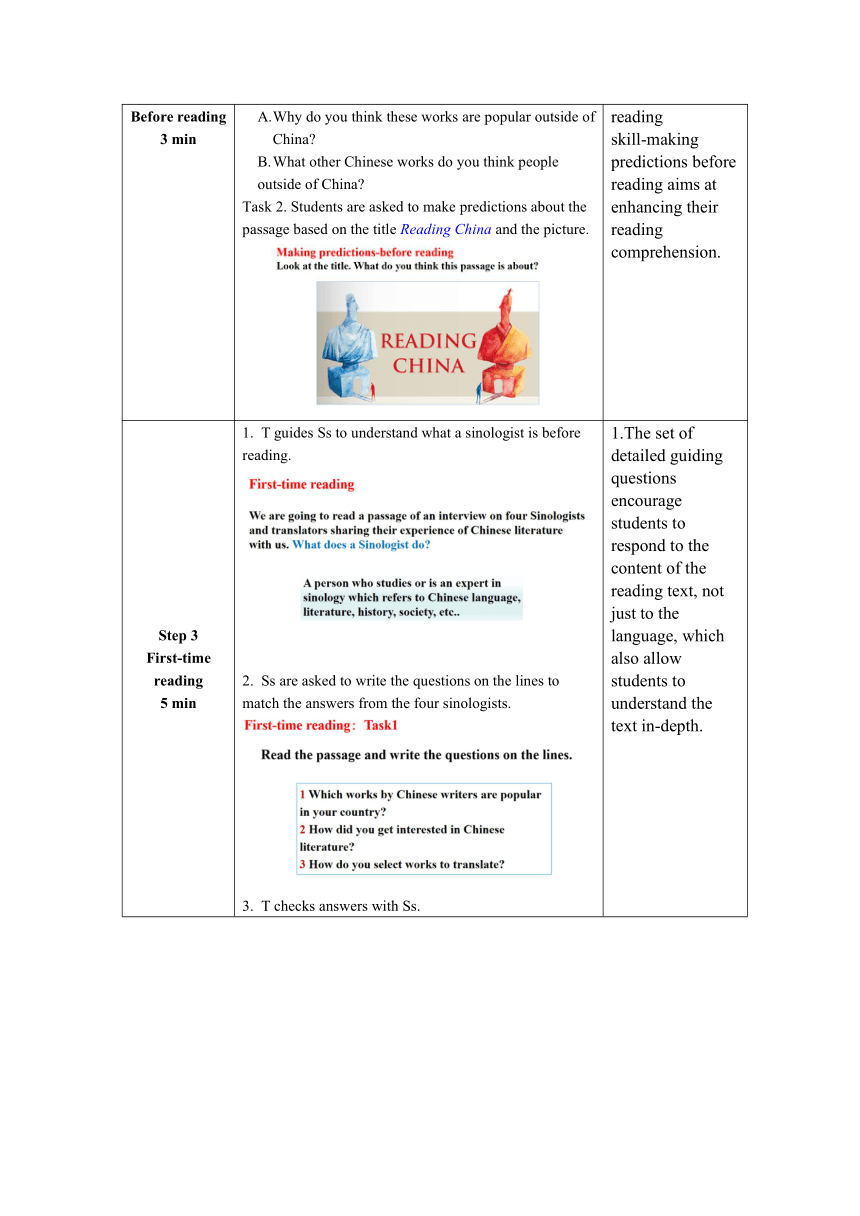外研版(2019)选择性必修第四册Unit 3 The world meets China-Developing ideas Reading China教学设计
文档属性
| 名称 | 外研版(2019)选择性必修第四册Unit 3 The world meets China-Developing ideas Reading China教学设计 |  | |
| 格式 | zip | ||
| 文件大小 | 1.6MB | ||
| 资源类型 | 教案 | ||
| 版本资源 | 外研版(2019) | ||
| 科目 | 英语 | ||
| 更新时间 | 2022-04-24 20:50:14 | ||
图片预览



文档简介
Period 5
Developing ideas:Reading China
(40分钟)
内容分析:
本单元的主题语境是“人与社会”,涉及的主题语境内容是跨文化沟通,文化的包容与合作。Period 5 Developing ideas:Reading China立足于单元主题,语篇类型为访谈。课文中四位来自不同国家汉学家、译者(Petko,Annelous, Joachim和Mai)畅谈了中国文学走向世界的问题,包括他们如何对中国文学产生兴趣、如何选择要翻译的作品、中国文学在国外的影响力等。访谈的内容逻辑性强,访谈问题层层递进。
学情分析:
虽然学生从高一就开始接触访谈文体,但对用英语表达的中国古代和现代文学并不熟悉。难以深度理解中国文学的精髓以及在世界上的接受度与传播原因。针对这一问题教师将从学生熟悉的中国经典文学作品入手,一步步引导学生分析文本。从四位汉学家的访谈中理解中国文学以及分析广泛传播文学的共性,认识到其精髓。激发学生创新性思维,思考如何向世界弘扬中国文学及其中蕴含的文化传统。
教学目标:
经过本课学习,学生能够:
加深对中国传统文学与现代文学的了解,具体体现在了解如何用英语介绍若干文学巨作,如 《易经》,《论语》和《孙子兵法》等。
强化练习高中阶段所掌握的阅读技巧,如根据题目与图片预测文章内容;定位具体信息;和判断文章中角色观点并找出支撑其观点的依据。
通过学习四位汉学家的访谈,了解到世界对什么样的中国文学感兴趣以及为什么对中国文学感兴趣。为学生在思考如何推广中国文学这个大问题上做铺垫。
提升阅读与表达能力以及批判性和创新性思维能力。
教学重点和难点:
引导学生理解对话内容,对文中提到的文学作品进一步了解以及了解到世界对什么样的中国文学感兴趣以及为什么对中国文学感兴趣;(教学重点)
带领学生分析中国文学受欢迎的特点及共性,激发学生创造力和解决问题的能力(如何推广一部中国文学)。(教学难点)
Teaching Procedures:
Steps Activities Purposes
Step 1 Lead-in 8 min T shows Ss 7 pictures and asks them to match the books with the pictures. T shows the brief introduction of each book while eliciting answers. 1.To activate Ss’ prior knowledge aiming at enhancing reading comprehension starting from sth they are familiar with. 2. To lead in the topic and guide Ss to think about how can these works be introduced in English.
Step 2 Before reading 3 min Task 1.T asks Ss two questions: Why do you think these works are popular outside of China What other Chinese works do you think people outside of China Task 2. Students are asked to make predictions about the passage based on the title Reading China and the picture. Practicing reading skill-making predictions before reading aims at enhancing their reading comprehension.
Step 3 First-time reading 5 min T guides Ss to understand what a sinologist is before reading. Ss are asked to write the questions on the lines to match the answers from the four sinologists. T checks answers with Ss. 1.The set of detailed guiding questions encourage students to respond to the content of the reading text, not just to the language, which also allow students to understand the text in-depth.
Step 4 Second-time reading 5 min Task 1. T guides Ss to analyze 5 long and difficult sentences. Task 2. Ss are asked to match people to their opinions and find evidence to support their choices. Help Ss overcome language difficulties for the purpose of bettering their reading comprehension and enabling them to answer deeper questions. Help Ss reason and find evidence to support their choices.
Step 5 Post-reading 8 min Task1 T asks Ss to think about and answer these two questions (Language support is provided on the slide): What work would you recommend as an introduction to Chinese literature Why Which works of Western literature are popular in China What make them popular Task 2 Ss are asked to think about the big question: how to promote Chinese literature throughout the world. T guides Ss to break down the big question into a series of small questions(learning to learn). Ss are inspired to think this question through three aspects as shown below. Enhance Ss’ learnt knowledge further by expressing their ideas which requires critical and creative thinking. Scaffolding is provided by the teacher to assure that students of different levels can engage in producing some opinions related to the given topic. 3. Internalize Ss’ knowledge by transferring input into output.
Reflection 3 min Ss are asked to reflect on class performance by filling in self-reflection cards. Reflective think could help Ss to feel more intellectually involved in their role and study and enable them to cope with the areas of strength and weakness.
Homework: Ss can choose to promote a Chinese literature masterpiece through three aspects(types, methods and content in form of an article. Language support is provided. Phrase bank Chinese/western classical/ancient/modern literature; works from ... dynasties reading sth is/was a stimulating and inspiring experience learn about/ reflect(s) Chinese culture and everyday life in China reflects human nature and experience Nobel Prize in Literature In terms of type/ method/content, ... Sentence bank The reason why... is that... That is due to On the whole To sum up,... In short,...
Developing ideas:Reading China
(40分钟)
内容分析:
本单元的主题语境是“人与社会”,涉及的主题语境内容是跨文化沟通,文化的包容与合作。Period 5 Developing ideas:Reading China立足于单元主题,语篇类型为访谈。课文中四位来自不同国家汉学家、译者(Petko,Annelous, Joachim和Mai)畅谈了中国文学走向世界的问题,包括他们如何对中国文学产生兴趣、如何选择要翻译的作品、中国文学在国外的影响力等。访谈的内容逻辑性强,访谈问题层层递进。
学情分析:
虽然学生从高一就开始接触访谈文体,但对用英语表达的中国古代和现代文学并不熟悉。难以深度理解中国文学的精髓以及在世界上的接受度与传播原因。针对这一问题教师将从学生熟悉的中国经典文学作品入手,一步步引导学生分析文本。从四位汉学家的访谈中理解中国文学以及分析广泛传播文学的共性,认识到其精髓。激发学生创新性思维,思考如何向世界弘扬中国文学及其中蕴含的文化传统。
教学目标:
经过本课学习,学生能够:
加深对中国传统文学与现代文学的了解,具体体现在了解如何用英语介绍若干文学巨作,如 《易经》,《论语》和《孙子兵法》等。
强化练习高中阶段所掌握的阅读技巧,如根据题目与图片预测文章内容;定位具体信息;和判断文章中角色观点并找出支撑其观点的依据。
通过学习四位汉学家的访谈,了解到世界对什么样的中国文学感兴趣以及为什么对中国文学感兴趣。为学生在思考如何推广中国文学这个大问题上做铺垫。
提升阅读与表达能力以及批判性和创新性思维能力。
教学重点和难点:
引导学生理解对话内容,对文中提到的文学作品进一步了解以及了解到世界对什么样的中国文学感兴趣以及为什么对中国文学感兴趣;(教学重点)
带领学生分析中国文学受欢迎的特点及共性,激发学生创造力和解决问题的能力(如何推广一部中国文学)。(教学难点)
Teaching Procedures:
Steps Activities Purposes
Step 1 Lead-in 8 min T shows Ss 7 pictures and asks them to match the books with the pictures. T shows the brief introduction of each book while eliciting answers. 1.To activate Ss’ prior knowledge aiming at enhancing reading comprehension starting from sth they are familiar with. 2. To lead in the topic and guide Ss to think about how can these works be introduced in English.
Step 2 Before reading 3 min Task 1.T asks Ss two questions: Why do you think these works are popular outside of China What other Chinese works do you think people outside of China Task 2. Students are asked to make predictions about the passage based on the title Reading China and the picture. Practicing reading skill-making predictions before reading aims at enhancing their reading comprehension.
Step 3 First-time reading 5 min T guides Ss to understand what a sinologist is before reading. Ss are asked to write the questions on the lines to match the answers from the four sinologists. T checks answers with Ss. 1.The set of detailed guiding questions encourage students to respond to the content of the reading text, not just to the language, which also allow students to understand the text in-depth.
Step 4 Second-time reading 5 min Task 1. T guides Ss to analyze 5 long and difficult sentences. Task 2. Ss are asked to match people to their opinions and find evidence to support their choices. Help Ss overcome language difficulties for the purpose of bettering their reading comprehension and enabling them to answer deeper questions. Help Ss reason and find evidence to support their choices.
Step 5 Post-reading 8 min Task1 T asks Ss to think about and answer these two questions (Language support is provided on the slide): What work would you recommend as an introduction to Chinese literature Why Which works of Western literature are popular in China What make them popular Task 2 Ss are asked to think about the big question: how to promote Chinese literature throughout the world. T guides Ss to break down the big question into a series of small questions(learning to learn). Ss are inspired to think this question through three aspects as shown below. Enhance Ss’ learnt knowledge further by expressing their ideas which requires critical and creative thinking. Scaffolding is provided by the teacher to assure that students of different levels can engage in producing some opinions related to the given topic. 3. Internalize Ss’ knowledge by transferring input into output.
Reflection 3 min Ss are asked to reflect on class performance by filling in self-reflection cards. Reflective think could help Ss to feel more intellectually involved in their role and study and enable them to cope with the areas of strength and weakness.
Homework: Ss can choose to promote a Chinese literature masterpiece through three aspects(types, methods and content in form of an article. Language support is provided. Phrase bank Chinese/western classical/ancient/modern literature; works from ... dynasties reading sth is/was a stimulating and inspiring experience learn about/ reflect(s) Chinese culture and everyday life in China reflects human nature and experience Nobel Prize in Literature In terms of type/ method/content, ... Sentence bank The reason why... is that... That is due to On the whole To sum up,... In short,...
